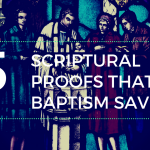I once heard a Reformed seminary professor confess that several texts in scripture sound like baptismal regeneration, but because of one specific text, he denied the possibility. That text comes from 1 Corinthians,
“I appeal to you, brothers, by the name of our Lord Jesus Christ, that all of you agree, and that there be no divisions among you, but that you be united in the same mind and the same judgment. For it has been reported to me by Chloe’s people that there is quarreling among you, my brothers. What I mean is that each one of you says, “I follow Paul,” or “I follow Apollos,” or “I follow Cephas,” or “I follow Christ.” Is Christ divided? Was Paul crucified for you? Or were you baptized in the name of Paul? I thank God that I baptized none of you except Crispus and Gaius, so that no one may say that you were baptized in my name. (I did baptize also the household of Stephanas. Beyond that, I do not know whether I baptized anyone else.) For Christ did not send me to baptize but to preach the gospel, and not with words of eloquent wisdom, lest the cross of Christ be emptied of its power.”
The argument goes something like this: Paul went to Corinth to save those who were lost. Paul preached the gospel but did not baptize. Therefore, Paul viewed the preaching of the gospel as saving but not the act of baptism.
My initial reaction to this argument is simple that the text has nothing to say directly about the effect of baptism, so that to infer from this that baptism serves a symbolic purpose (or something slightly above that) is stretching the text beyond what is exegetically tenable.
But if we are to infer anything from this text about the efficacy of baptism, I would argue that it necessitates something beyond a purely symbolic approach. Paul is assuming that those who baptized the individual in the congregation would be so identified with the one receiving the sacrament that those receiving baptism would attribute their Christian life to the hands of the baptizer.
Paul assumes a saving efficacy in the baptismal act, because he shows that those who were baptized by Paul would look at Paul in the role that Christ himself has in our salvation. As Paul rhetorically asks, “was Paul crucified for you?” I cannot imagine a situation in a church wherein a purely symbolic act would so divide a church that those receiving such an “ordinance” would divide themselves over who performed this ordinance for them.
This belief of the Corinthians is further seen as Paul references the fact that the Corinthians were baptizing for the dead. Would one go to such extremes for an act which has no spiritual significance other than an act of profession among men or entrance into an external covenant with no real soteric benefits? It doesn’t seem plausible.











